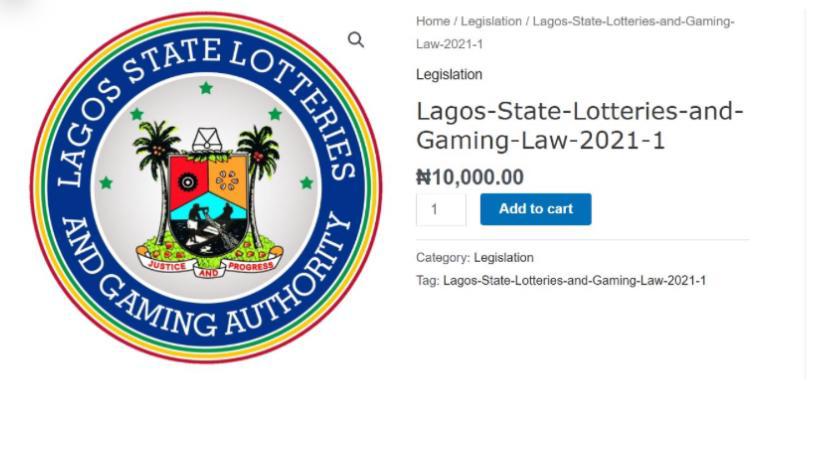BY MICHAEL DUGERI
In a period when Nigerians are increasingly burdened by new taxes and shrinking economic reliefs, nothing illustrates the state’s extractive posture more clearly than asking citizens to pay to access the law itself. It undermines the rule of law, weakens public trust and turns legality into a commodity.
Nigeria is experiencing a moment of deep fiscal anxiety. The removal of fuel subsidies, new tax reform bills, aggressive revenue drives by federal and state agencies and rising inflation have left many citizens feeling that the state is increasingly present only when it wants to collect. The concern is not just about paying more taxes, but about the sense that government is willing to extract revenue from any available channel, regardless of fairness or legality. Nothing illustrates this better than a practice that has quietly existed for years but is only now thrown into sharp relief by the public mood: in Lagos State, residents must pay ₦10,000 to download the bare text of the Lagos State Lotteries and Gaming Authority Law 2021.
This is not a premium legal commentary, an annotated guide or a printed gazette. It is the law itself, unaltered and in digital form, sold by the very agency responsible for enforcing it. The practice began when the law was enacted and has continued without scrutiny or justification. Few things more clearly express the state’s current attitude to public finance than the idea that citizens should pay to know the law. Whether this qualifies as a form of taxation or as something more troubling, namely the commodification of legality, is an open question. What is clear is that it conflicts with the foundational principle that laws binding on the public must be freely accessible to the public.
Advertisement
The substance of the law makes this even more significant. The Lagos State Lotteries and Gaming Authority Law regulates lotteries, casinos, sports betting, online gaming and related activities in Lagos, which is Nigeria’s commercial hub. Sport betting in particular has become a daily ritual and, for many young Nigerians facing unemployment and uncertainty, a fragile form of hope or escape. Operators, betting shop owners, agents and individuals are all subject to this law. To make access to it conditional on payment does not merely raise governance concerns; it undermines compliance, fairness and the legitimacy of regulation itself.
Legally, the practice sits on unstable ground. The Nigerian Constitution guarantees the right to a fair hearing, which includes the right to be informed of the substance of any law or charge one is accused of violating. Courts have held that once a law is passed and published in the official gazette, it enters the public domain and binds all persons within the jurisdiction. Section 2 of the Lagos State Freedom of Information Law, 2011, further mandates public institutions to proactively make information available, especially where it concerns public rights and obligations. There is no known provision in the Lotteries and Gaming Law, nor in its subsidiary regulations, authorising the authority to sell digital access to the statute. The agency did not enact the law; it merely administers it. The power to publish legislation belongs to the state legislature and the government printer, not to regulatory bodies.
The implications for governance are immediate. Regulation depends on voluntary compliance, which in turn depends on public access to clear and predictable rules. When access is priced, compliance becomes a privilege of those who can afford it or who retain legal counsel. This creates an uneven playing field and gives room for selective or arbitrary enforcement, as a regulator can enforce breaches of rules that the regulated public may not even have seen. It also blurs the constitutional separation of powers by giving an executive agency control over the dissemination of legislation passed by the legislature.
Advertisement
Comparatively, the Lagos approach is unusual. While access to state laws across Nigeria is inconsistent, several states, such as Ekiti and Delta, publish some of their laws or gazettes online at no cost. At the federal level, the Laws of the Federation are available on official portals of the Federal Ministry of Justice, although many are not fully up to date. Globally, jurisdictions such as Kenya, South Africa, the United Kingdom and Canada provide free digital access to their statutes. Where revenue is generated, it is from printed gazettes or enhanced versions with commentary, not from the basic legal text. There are a few known examples in democratic governance of an agency selling the bare law it enforces.
This raises both ethical and constitutional concerns. The rule of law rests on transparency and public notice. A law that is hidden behind a paywall may exist on paper, but it fails in purpose if the governed cannot reasonably access it. Public trust also suffers. When legality itself becomes a commodity, the idea of law as a shared social contract weakens, replaced by the notion that legal knowledge is a privilege to be purchased. At a time when trust in institutions is already low, practices like this further alienate citizens from the state.
This is not an argument against government recovering costs for printed official gazettes or producing value-added legal publications. Nor is it a denial of the need to expand Nigeria’s tax base. Rather, it is a question of boundaries: can the state, in pursuit of revenue, charge citizens to see the law? The answer, both in principle and in comparative practice, should be no. Free access to legislation is the foundation upon which compliance, accountability and democratic governance are built.
This issue is no longer simply about one agency or one law. It speaks to a larger question that confronts Nigeria today: what is the nature of the relationship between the state and the governed? In a period marked by rising taxes, subsidy removals and aggressive revenue collection, citizens expect at the very least that the law itself remains a public good, not a paid service. A state that asks people to pay to see the rules it enforces risks turning law from an instrument of justice into an instrument of exclusion.
Advertisement
Across modern democracies, access to legislation is treated as a constitutional baseline. It is what allows citizens to understand their rights, fulfil their obligations and hold power accountable. Once a government begins to charge for access to law, it blurs the boundary between taxation and coercion, between governance and rent-seeking. The danger is not only legal but institutional: public confidence erodes when legality appears to be for sale.
Nigeria’s pressing fiscal challenges are real. Expanding revenue is necessary. But legitimacy in taxation depends on fairness, transparency and restraint. Placing financial barriers between citizens and the law undermines all three. If the state expects compliance, it must first guarantee access. The law is not government property; it is the people’s right. Restoring that principle is essential not just for the integrity of the legal system, but for rebuilding trust in governance itself.
Michael Dugeri is a Toronto-based digital policy advisor whose work explores how emerging technologies, including artificial intelligence, are shaping freedom of creative expression in Africa.
Advertisement
Views expressed by contributors are strictly personal and not of TheCable.



